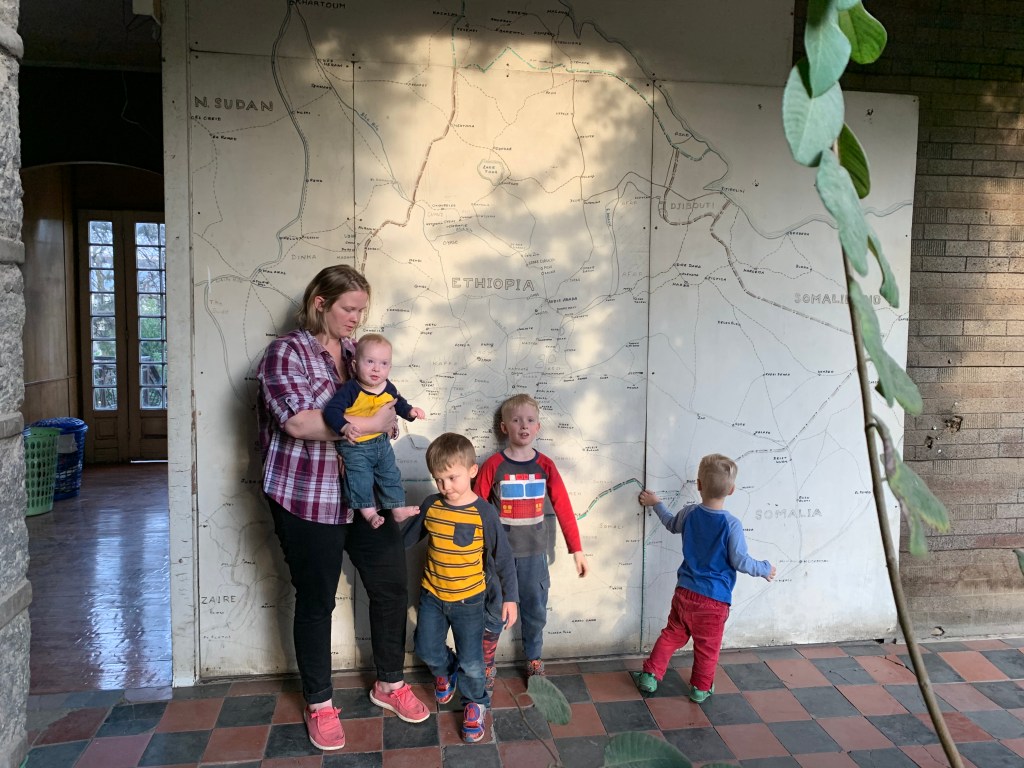This post is shamefully long overdue. I wrote this series last April, immediately after returning from Ethiopia after three years of absence and minimal contact. My heart was equal parts warmed and broken. Warmed by the resilience and selflessness I’ve witnessed among the people I’ve come to know and love over the last several years. Broken, having seen a level of suffering that until recently was so horrific that it was necessarily abstracted in my experience. Writing it out made the reality nearly unbearable; thinking about publishing it here was just too hard. But I think that it’s time.
It looks like our extended experience of transition and relative instability may be coming to a close in the very near future, and that a time of setting down roots is approaching. This is the beginning of this current phase in the life of our family.
We arrived in Addis Ababa on December 28, 2019, with 21 pieces of checked luggage, six carryon bags and six personal items. Our plan was to spend the next three years learning how to live in Mekelle, how to build community there. We left Mekelle for the States on March 24, 2020 with two checked bags, two carryon bags, and two personal items, fully expecting to return within a few months at most. I arrived in Addis Ababa on March 23, 2023 – one day shy of exactly three years from when we left. I returned to the States six days later, on March 29, with what was left of our household goods – three checked bags, one carryon, and one personal item.

My goals for this trip included 1) reconnecting with our friends and colleagues in Mekelle; 2) comparing the reported accounts of events that had occurred over the past three years with firsthand accounts; 3) determine whether we might be able to return in early 2024; 4) determine how we might be able to serve the people of Mekelle, Tigray, and Ethiopia from a home base in the States; and 5) determine which household goods to bring back to the States, and which to give away, as well as determine what to do with our 1991 LandCruiser.
My goal with this post is to share in detail the events of this trip, so that our supporters (and everyone else) can know as clearly as possible – that is, as clearly as we know – our plans for the future of Hands Outstretched. For those who don’t have the time and/or inclination to read the details, here’s a summary:
Tuesday, March 21
Kristen and the boys drove me to Des Moines midday, whence I flew to O’Hare and took a United flight to Frankfurt.
Wednesday, March 22
I arrived in Frankfurt early the next morning, and enjoyed a 12-hour layover at that fine establishment until my evening flight on Ethiopian Airlines to Addis Ababa.
Thursday, March 23
I was scheduled to arrive in Addis Ababa at 6 am on Thursday. However, thanks to a dense bed of fog covering the city, the plane looped the loop for about 90 minutes until it was safe to land. I had been concerned with my visa status, because just prior to our departure in 2020 we had obtained our resident visa status, which can only be renewed in country, and was therefore expired. I was advised my folks in the know to obtain a tourist visa online, but because of a slight kerfuffle in travel arrangements a few days before I left, the tourist visa authorized me to arrive on March 24. This resulted in several long conversations with several levels of immigration, consisting in profuse apologies on my part, as well as expressions of willingness to do whatever necessary to make it right. I was told more than once that I’d have to wait in the terminal until March 24 – another 16 hours. By the grace of God, because I could show that I was leaving the country the following week, I was allowed to pass through immigration without doing that particular penance. I picked up my luggage containing gifts for folks in Mekelle without incident and took a taxi to the guesthouse that I typically stay at in Addis.

I spent the morning catching up with Yimenashu, the woman that runs the guesthouse, and setting up my Ethiotelecom (ETC) account so that I could use my phone in country. Ethiopia has a state-run telecom service, and to use it, you have to go to an ETC office and register for a SIM card. Once you have the card, you can add credit by either visiting an ETC office or by purchasing cards from vendors that have a scratch-off code that you enter on the phone. I had the ETC SIM card that I’d been using when we left. I’ve been told that most of the time if a card has been out of service for more than six months ETC will cut it off, requiring another trip to an ETC office. Thankfully that wasn’t the case for my card, and I was able to add credit using the scratch-off cards, and was able to make several phone calls to folks in Mekelle and plan the details of my trip.
Thursday afternoon Fred and Vicki Van Gorkom arrived at the guesthouse. Fred is the Missions Deputy Director of Christian Veterinary Mission. He and Vicki served in Ethiopia for more than 20 years before moving to Seattle to serve as CVM administrators. My trip coincided with a trip they were making with some friends, one of whom was from Tigray. We shared a nice dinner of injera with yetsom beyenatu, after which I showered and promptly fell very, very asleep.
This is part one of six of the report of my time in Ethiopia in March 2023. Part two can be found here.

